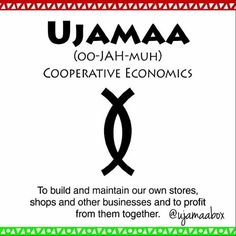Ujamaa means Cooperative Economics
As we move further into the celebration of Kwanzaa we can see how each principal builds upon the next. Cooperative Economics calls for each of the characteristics we’ve learned, unity in our thinking as a community, the motivation of self-determination and the ability to responsibly work collectively. Ujamaa or cooperative economics is popularly defined as, “To build our own businesses, control the economics of our own community and share in all its work and wealth.” A lot of people are limited in their thinking in relation to this concept. Although Cooperative Economics does tie into supporting Black business, it also goes deeper than that with several methods that call for a development in perspective in thinking about developing a community economically.
Currently Black Americans do not control their own economics because so much of our financial income is dependent on those of other groups. Our survival depends on the resources of other groups more than our own because do not have our own resources to depend on for the survival of our community. For example, there are no Black owned agricultural or healthcare industries and the number of Black educational and financial institutions are decreasing rapidly from the number that there were twenty years ago. Without these very important aspects of society we will remain dependent on the industries and institutions of other groups. It’s up to us to go into these industries and build and support our own within them, but in America there are countless bars to African American business ownership and development. Over the years Black business centers have been deconstructed, wiped out and burned down for fear of cooperative economics leading to independence in the Black community.
On this third day of Kwanzaa, the lighting of candles starts again with the black one, then the farthest left red one and them the utmost right green one are lit. The family members who congregate discuss the meaning of the 3rd principle and share the unity cup. The candles are then extinguished. On this day I challenge each of us to at least begin the process by research of opening up an account with a Back owned bank if there’s one in your local area. In Washington State there are no Black owned banks, making it incredibly difficult for me to participate in cooperative economics in this way. I attempted to set up an account with United Bank online but the process for doing so out of state was complex and unsuccessful. While visiting home in Detroit I took advantage of being in the area by researching the criteria for opening up an account at one of the multiple Black owned banks in Detroit: Liberty, One United and First Independence Bank. For those in areas that are close to Black owned banks please take advantage of this privilege. When we direct our money flow through big banks like: Bank of America, Chase or Wells Fargo, we relinquish the power that we could have if we chose to bank with our own institutions. My goal when I buy my first home , that is a loan is needed I’d rather take my loan from a Black owned bank because ’d rather be owned by my own.
Cooperative economics recognizes the need to spend money, especially in a capitalist democracy where the direction of money flow indicates the direction of power flow from one group to another. Because we need to spend money cooperative economics allows us to do so in a way that developed the community while spending, it is at the heart of grassroots organizing. Newly-freed African people used cooperation and cooperatives to survive during and after slavery, pre-and post-Depression, and every decade up to the present.* Without the power behind the activity of pooling together financial resources newly freed slaves would have never survived.
Aside from simply buying black which is an important aspect of cooperative economics, there are several things we can do as a community to strengthen ourselves economically especially with the lack of black owned business options in several industries ranging from household necessities to food and groceries. The organization of a Buying Group, a group of individuals assigned to purchasing common household items like toilet paper, tooth paste, kitchen supplies and other items at wholesale price to distribute to the members of the community. Another cooperative economics method is the act of organized childcare, assigning a group of trusted individuals to look after the members children, this can also be extended to home schooling children. With organized childcare we can also seize the opportunity to teach Black history to our children who are otherwise deprived of this education in public schooling.
One very important aspect that we overlook is the power of organizing a discussion group, during my time at the University of Washington, a PWI, I was strengthened and motivated by the discussion that we had in our Black Student Union. Having safe space for people to share there frustrations as well as their ideas provides members with a positive outlet and a foundation for organizing. Discussion groups should meet regularly, it can be as little as quarterly or as often as weekly, the more often members meet the faster new ideas will circulate and go into action. All of these methods may be easier said than done for some, but we need to think about how little the initial cost of organizing is in comparison to the vast rewards and reduction of stress that this will have in the long run.
Ujamaa

